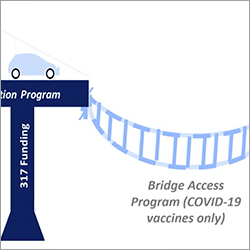By IDSE News Staff
A phase 1/2 trial of mRNA-1083, an investigational combination vaccine against influenza and COVID-19, achieved protection similar to the influenza and COVID-19 vaccines separately, according to maker Moderna, which released preliminary results in a statement.

The ongoing clinical trial (ClinicalTrials.gov Identifier: NCT05827926) is a randomized, observer-blind study evaluating the safety and immunogenicity of mRNA-1083 compared with a standard-dose influenza vaccine, Fluarix (GlaxoSmithKline), in adults 50 to 64 years of age and with an enhanced influenza vaccine, Fluzone HD (Sanofi), in adults 65 to 79 years of age. For both age groups, mRNA-1083 was compared with the Spikevax (Moderna) bivalent COVID-19 booster.
The mRNA-1083 candidate selected to advance to phase 3 trials achieved hemagglutination inhibition antibody titers similar to or greater than both licensed quadrivalent influenza vaccines and achieved SARS-CoV-2 neutralizing antibody titers similar to the bivalent booster in the phase 1/2 study. The combination vaccine resulted in geometric mean titer (GMT) ratios of more than 1.0 relative to all four influenza strains in both Fluarix and Fluzone, according to Moderna. The GMT ratios of mRNA-1083 relative to Spikevax bivalent vaccine were more than 0.9 in adults 50 to 64 years of age and more than 1.0 in adults 65 to 79 years old.
Reported rates of elicited local and systemic adverse reactions after mRNA-1083 administration were similar to the standalone COVID-19 vaccine group in the trial. Most of the adverse reactions were grade 1 or 2 in severity. Grade 3 local or systemic reactions were reported in less than 4% of participants ages 50 years and older. No new safety concerns were identified for mRNA-1083 compared with the standalone vaccines, the company said.
“Flu and COVID-19 represent a significant seasonal burden for individuals, providers, healthcare systems and economies. Combination vaccines offer an important opportunity to improve consumer and provider experience, increase compliance with public health recommendations, and deliver value for healthcare systems. We are excited to move combination respiratory vaccines into Phase 3 development and look forward to partnering with public health officials to address the significant seasonal threat posed to people by these viruses,” said Stéphane Bancel, Moderna’s CEO, in the statement.
Moderna plans to begin a phase 3 trial of mRNA-1083 this year, and is targeting potential regulatory approval for the combination vaccine in 2025.
Worldwide, influenza leads to 3 million to 5 million cases of severe disease and 290,000 to 650,000 influenza-related respiratory deaths annually, despite the availability of current influenza vaccines. The SARS-CoV-2 virus remains a leading cause of severe illness and mortality throughout the world. Since the start of the pandemic in 2020, there have been approximately 770 million cases of COVID-19 respiratory illness and approximately 7 million deaths reported globally, with more than 1.1 million of those in the United States.
The global influenza vaccine market volume is approximately 500 million to 600 million doses annually, with approximately 150 million doses administered in the United States. Moderna estimates the U.S. fall 2023 COVID-19 vaccine market size as likely to be 50 million to 100 million doses, depending on vaccination rates. Over time, the company anticipates the COVID-19 vaccine market will approach that for influenza in this country, given the burden of disease.
Moderna previously announced that it expects respiratory product sales in 2027 to be in the range of $8 billion to $15 billion, with corresponding respiratory product operating profit in the range of $4 billion to $9 billion.




